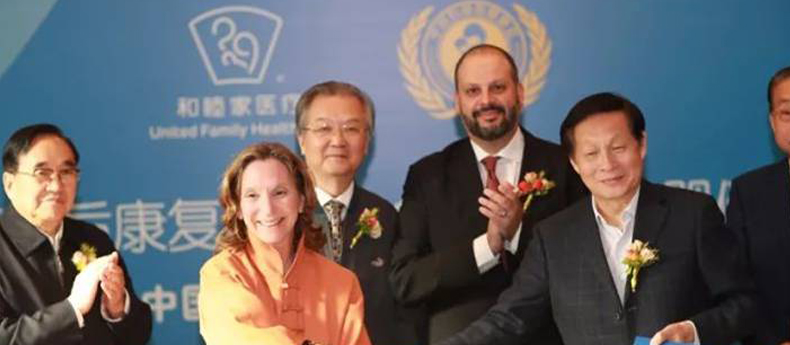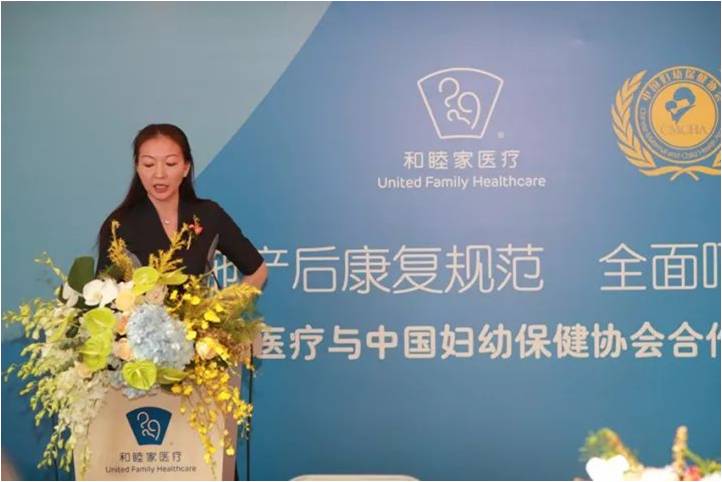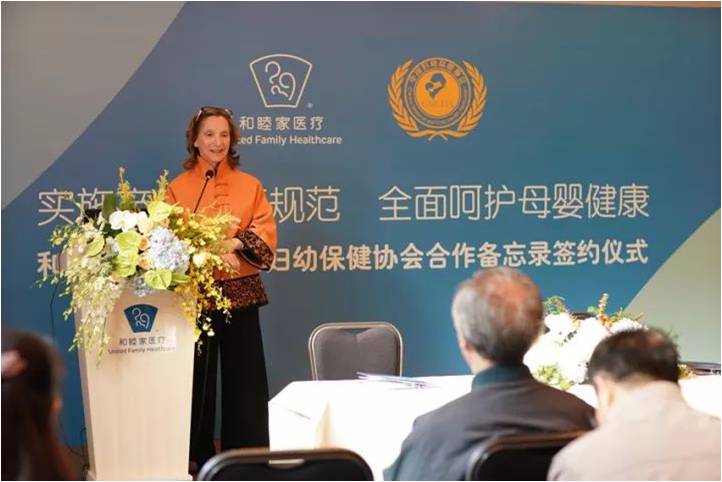
United Family Healthcare Partners with the Maternal and Child Health Care of China Association (MCHCCA)
On November 12, 2017, the Maternal and Child Health Care of China Association (MCHCCA) and United Family Healthcare (UFH) signed a memorandum of cooperation, according to which the two sides will cooperate in implementing postpartum rehabilitation norms in order to provide comprehensive health care services with regards to maternal and child health. The ceremony was presided over by Mr. Zhang Wenkang, Former Minister of Health and lifelong Honorary President of MCHCCA, Mr. Yu Xiaoqian, Vice President and Secretary General of MCHCCA, and Ms. Roberta Lipson, Founder and CEO of UFH.
Market Demand Calls for Safe Postpartum Rehabilitation
With improvements in living standards and changes in consumption patterns, an increasing number of new mothers are changing their traditional habit of “sitting yuezi” (one-month confinement) at home after giving birth. Instead, many Chinese mothers choose to stay at professional postpartum rehabilitation institutions for high-quality postpartum care. The implementation of the two-child policy has resulted in an increase in both the average maternal age and the birth rate, bringing higher demand for maternal and child health services with a medical focus.
“As a new special industry, the current admission system, service standard, and market supervision of rehabilitation institutions in China are imperfect with various problems such as improper maternal wound care, infection risk, insufficient neonatal care and emergency care, and so on,” said Minister Zhang.
How to provide diversified services, standardize industry behaviors, formulate industry standards, and ensure the safety and overall quality of services has become the most important problem facing the industry.
The concept of postpartum rehabilitation originated from more developed western countries, where postpartum rehabilitation systems are already mature. All rehabilitation institutions in these countries have strict regulations concerning facilities, equipment, environment, and personnel allocation, and are supported by medical professionals.
At the same time, China’s rich tradition of yuezi has long served new mothers by providing support, guidance, comfort and recovery during the first month after birth. Combining these two concepts—scientific postpartum rehabilitation with traditional Chinese yuezi—is the goal of the MCHCCA-UFH partnership.
In 2015 and 2016, MCHCCA consecutively issued guidelines for the development of postpartum maternal and child rehabilitation institutions. According to these requirements, postpartum rehabilitation should be supported by medical professionals, and it is more appropriate for professional medical institutions to engage in postpartum rehabilitation services.
Chinese Mothers Need Scientific Postpartum Rehabilitation
From the perspective of modern medicine, the traditional habits of yuezi such as not bathing, wearing too much clothing, consuming excessive nutrients, and sleeping for too long periods of time without enough exercise, lack scientific evidence.
Dr. Qin Xinyan, Chief Medical Officer of Beijing United Family Rehabilitation Hospital, which houses UFH’s first postpartum rehabilitation center, points out that throughout the process of pregnancy and childbirth, all systems of the body will make adjustments along with the natural changes in hormone levels. Many new mothers experience abdominal muscle issues, may have difficulty walking, or even suffer urinary incontinence.
However, little attention is paid to these problems in the traditional practice of yuezi. As a result, many mothers experience ailments such as urinary incontinence, neck pain, or back pain for a period of up to four or five years after giving birth to a child.
Dr. Qin emphasized, “Chinese mothers need scientific postpartum rehabilitation care. For example, we encourage postpartum mothers to receive a functional assessment of the abdominal and pelvic muscles affected by childbirth, and apply muscle activation training under the guidance of professional specialists in order to enhance muscle strength and activate the core muscle groups.”
A variety of other issues, such as postpartum depression, breast duct obstruction (mastitis), fat accumulation, postpartum scarring, De Quervain’s disease, heel pain and other common problems, also require professional support, rehabilitation, psychology, nutritional consultation and other related medical support.
BJURH CMO Dr. Qin Xinyan emphasizes the importance of scientific and standardized postpartum rehabilitation
Mr. Yu Xiaoqian, Executive Vice President and Secretary General of MCHCCA, stressed that postpartum rehabilitation is not simply a type of ‘confinement’ as in the past. Rather, through professional rehabilitation and proper education in postpartum care, both mother and child may enjoy lifelong benefits.
Postpartum rehabilitation exemplifies United Family Healthcare’s continuity of care medical services model. “UFH’s continuity of care medical services are not merely reflected in maternal care,” said Ms. Roberta Lipson, CEO and Founder of United Family Healthcare, “but also in our continuum of related services from fertility, pregnancy planning, pre-natal care, birth, postpartum rehabilitation, to pediatrics and family medicine.” As a foreign-funded medical institution that has been operating for 20 years in China, UFH has been a pioneer in providing comprehensive medical services, establishing a continuum of care that covers preventive health, diagnosis, treatment, and rehabilitation.
Ms. Roberta Lipson, UFH Founder and CEO delivers a speech to share UFH’s concept and practice of continuous medical service
Mr. Joshua Kurtzig, UFH Vice President for Postpartum Rehabilitation and Healthcare Partnerships, added that UFH postpartum rehabilitation services are already available in United Family Hospitals in Beijing and Qingdao, and will launch in Shanghai and Guangzhou next year, with plans to expand to more cities in the future. UFH’s partnership with MCHCCA will give full play to the inherent advantages of UFH with regard to experience, concepts, management and other related aspects of postpartum rehabilitation. The partnership will also enable the development and implementation of a standardized set of service practices to promote standardized postpartum rehabilitation services and technology throughout the country.
Mr. Joshua Kurtzig, Vice President of United Family Healthcare Postpartum Rehabilitation and Healthcare Partnerships, expresses great expectations for future cooperation between both parties
Copyright United Family Healthcare 2014 All right reserved - 京卫网审[2014]第1927号 - 京ICP备13017554号-4 医疗广告审查证明文号:(京)医广【2018】第12-28-1021号






